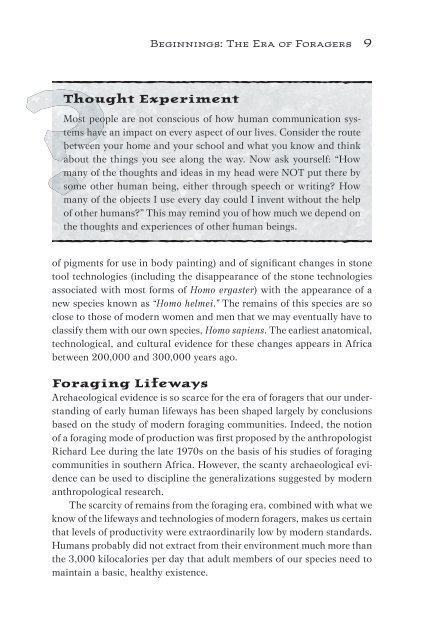This Fleeting World
This Fleeting World
This Fleeting World
Create successful ePaper yourself
Turn your PDF publications into a flip-book with our unique Google optimized e-Paper software.
Beginnings: The Era of Foragers <br />
Thought Experiment<br />
Most people are not conscious of how human communication systems<br />
have an impact on every aspect of our lives. Consider the route<br />
between your home and your school and what you know and think<br />
about the things you see along the way. Now ask yourself: “How<br />
many of the thoughts and ideas in my head were NOT put there by<br />
some other human being, either through speech or writing? How<br />
many of the objects I use every day could I invent without the help<br />
of other humans?” <strong>This</strong> may remind you of how much we depend on<br />
the thoughts and experiences of other human beings.<br />
of pigments for use in body painting) and of significant changes in stone<br />
tool technologies (including the disappearance of the stone technologies<br />
associated with most forms of Homo ergaster) with the appearance of a<br />
new species known as “Homo helmei.” The remains of this species are so<br />
close to those of modern women and men that we may eventually have to<br />
classify them with our own species, Homo sapiens. The earliest anatomical,<br />
technological, and cultural evidence for these changes appears in Africa<br />
between 200,000 and 300,000 years ago.<br />
Foraging Lifeways<br />
Archaeological evidence is so scarce for the era of foragers that our understanding<br />
of early human lifeways has been shaped largely by conclusions<br />
based on the study of modern foraging communities. Indeed, the notion<br />
of a foraging mode of production was first proposed by the anthropologist<br />
Richard Lee during the late 1970s on the basis of his studies of foraging<br />
communities in southern Africa. However, the scanty archaeological evidence<br />
can be used to discipline the generalizations suggested by modern<br />
anthropological research.<br />
The scarcity of remains from the foraging era, combined with what we<br />
know of the lifeways and technologies of modern foragers, makes us certain<br />
that levels of productivity were extraordinarily low by modern standards.<br />
Humans probably did not extract from their environment much more than<br />
the 3,000 kilocalories per day that adult members of our species need to<br />
maintain a basic, healthy existence.


